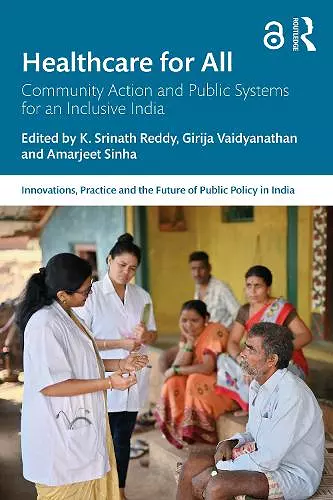Healthcare for All
Community Action and Public Systems for an Inclusive India
Amarjeet Sinha editor K Srinath Reddy editor Girija Vaidyanathan editor
Format:Paperback
Publisher:Taylor & Francis Ltd
Published:20th Oct '25
Should be back in stock very soon
This paperback is available in another edition too:
- Hardback£155.00(9781041123408)

This book offers a comprehensive analysis of India’s healthcare challenges and the pathways to achieving universal health coverage. It critically examines the current healthcare landscape, highlighting persistent issues such as undernutrition, demographic transitions, and pandemic vulnerabilities.
The book emphasises the importance of strengthening public healthcare systems, investing in human resources, and adopting a community-centred approach to health policy. It discusses the need for decentralised community action, substantial public investment in healthcare infrastructure, addressing urban health challenges, and developing a more inclusive and accessible healthcare model. Drawing on microstudies from across different states, the volume offers evidence-based recommendations for policymakers to transform India’s healthcare ecosystem and make quality healthcare a reality for all. Its multidisciplinary approach – spanning healthcare policy, economics, and social development – ensures relevance across diverse professional domains while maintaining a clear focus on healthcare improvement in India. This broad yet focused perspective makes it a valuable resource for both specialists in the field and those seeking to understand the complexities of India’s healthcare challenges and solutions.
Part of the Innovations, Practice and the Future of Public Policy in India series, this open access volume will interest policy professionals, administrators, academics, and researchers in public health, healthcare economics, and development studies.
This book is freely available as a downloadable Open Access PDF at http://www.taylorfrancis.com under a Creative Commons (CC-BY-NC-ND) 4.0 license.
‘These volumes fill a unique niche in the continuum between academic research and advocacy. They go beyond merely identifying challenges in various aspects of human development, particularly health, nutrition, and education, and instead explore potential solutions through critical reviews of what works. This makes the collection immensely valuable to both academicians and practitioners, rendering these volumes essential reading for anyone interested in public policy.’
Sonalde Desai, Professor, National Council of Applied Economic Research and University of Maryland, USA.
‘Human development cannot be viewed segmentally through a reductionist lens, since the various elements are closely integrated and impact each other. Health is inseparable from nutrition, and both are influenced by education, environment and economic development. In each of these, equity is the litmus test of development serving its social purpose. These six volumes knit these varied skeins into a unified tapestry of human development. While detailing the key components of each of the main themes, the composite collection connects them to create a coherent design for accelerated and equitable people centric human development in India.’
K. Srinath Reddy, Founder (Past) President,Public Health Foundation of India
‘These volumes compile the results of many micro studies in the areas of health, nutrition, education and rural livelihood development. These are critical areas where India needs to improve performance to achieve the objective of Viksit Bharat. Larger funding is unavoidable but even more important is to ensure efficiency of spending and it is here that these micro studies will provide evidence-based guidance in what works and in what circumstances. The solutions will not be the same across all states and this must be built into the design of each programme at the state level. The collection is an invaluable contribution in this very important area.’
Montek Singh Ahluwalia, Ex–Deputy Chairman, Planning Commission of India
‘This book is a comprehensive introduction to the perspectives, problems and challenges that define India’s quest for universal health coverage. Every paper in this collection reiterates a simple, yet essential message - that for Healthcare for All to become a reality, it has to be based on strengthened public services, delivered with public as active participants, characterised by what the book calls, its publicness. This message is evidenced and reiterated across the different chapters that draw lessons from the experience of the last two decades in India and elsewhere. The book also has chapters that provide how human resource challenges are managed, capacities are built and how social and commercial determinants of health are addressed. Addressing the challenges needs finances, innovation, and technology but above all, it needs a community connect.’
T. Sundararaman, Ex–Executive Director, National Health System Resource Centre, India
‘Healthcare for All is a comprehensive volume on health and public policy in India. It contains well-researched papers; some of them carry clear messages that strengthening the public health system is vital to achieving the goals of "Viksit Bharat". It raises vital questions of public policy choice – should India grow by GDP numbers, or should it grow by investing in human capital? Should GDP size be the end of public policy or should it be a means to achieving the well-being of the people? With this larger question on public policy choices, this volume goes on to argue that universal health care, is vital to: (a) “converting demography into a dividend”, (b) “promoting human capital” with a view to raising productivity, and finally (c) enabling the “lives of dignity” to the people.
Ashok Pankaj, Professor, Council for Social Development, India
ISBN: 9781041123514
Dimensions: unknown
Weight: 970g
496 pages